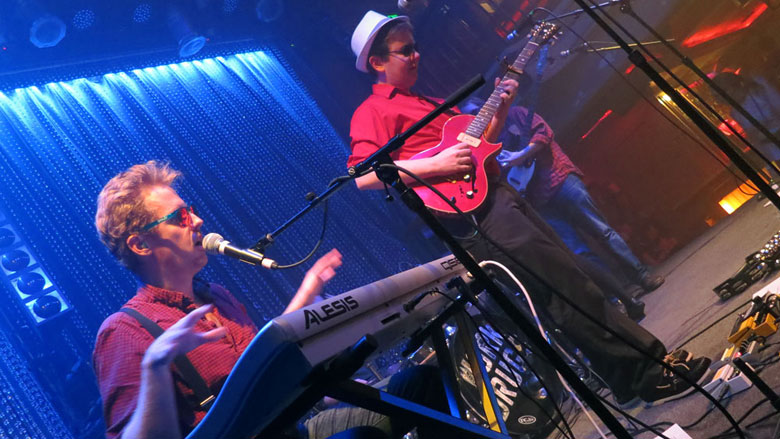The BLOG: Culture
The appeal of Work Drugs
James P. Freeman | May 19, 2016
(Photo by Kate Bracaglia, thekey.xpn.org)
“Sailing away down to the keys
Losing our rhythm to the ocean breeze”
— “Third Wave”
Close your eyes. Imagine … that suave buccaneer, aboard an exquisite nautical vessel. Blue skies. Setting sun. Champagne. Girl on the bow. By and large … it needs a soundtrack equally grandiose and smooth. Where’s the Work Drugs?
Led by the singer-songwriter duo of Thomas Crystal and Benjamin Louisiana — under the moniker of Work Drugs — they are self-described as “Philadelphia’s premier Bat Mitzvah and Quincenera party band,” by way of the Florida Keys. With a sense of fun and frivolity, Work Drugs makes music specifically for “boating, sexting, dancing, yachting and living.” But their work is serious: crafting the perfect pop song.
The Crystal-Benjamin team occupies a space in the indie-pop scene known as dream pop. The music of Work Drugs, however, is a permutation in the idiom of dream pop, which has been described as “chill-wave,” “smooth-fi,” “glo-fi,” and “sedative-wave.” It is a nod to the lush arrangements, sonic textures and contagious melodies of 70s soul-pop and 80s synth-pop, crafting a sound at once ethereal, atmospheric, contemporary and immediate.
Philadelphia plays a prominent role in the group’s story.
The “DIY music scene,” reported philly.com last year, combines a do-it-yourself-ethos in a “lo-fi setting – perfect for capturing the sound of Philadelphia’s hard-to-define DIY bands.” Embracing that independent spirit, “artists want plain ownership over everything… a liberating thing.”
Like their contemporaries, Work Drugs looks at the fractured model of today’s music business and essentially discards it as a remnant of a by-gone era. While they record on indie-label Bobby Cahn Records, Crystal and Louisiana maintain a low key approach to marketing, relying, instead, upon self-promotion and self-production as a means to retain artistic control.
They use social media to convey their own visual presentation and messaging, what corporate professionals would call “unique branding.” The band believes it was one of the first acts to adopt the “creative outlet” of Tumblr to project an original aesthetic. Tellingly, you will find few publicity photos of its members; as a substitute, they prefer minimalist imagery on its prolific single and album cover art output (see the digital sleeves for “Misfits” and “Summer Blood”).
Most importantly, Philly’s musical lineage – specifically, blue-eyed soul – informs its own music, such as Teddy Pendergrass, Barry White, and the most successful pop-duo ever, Hall & Oates. Crystal happily concedes that his parents’ record collection included Michael McDonald and Steely Dan. And other “smooth sounds” from that era such as George Bensen, Steve Winwood, Kenny Loggins, and the Doobie Brothers.
At their core, Crystal and Louisiana are keen observers and surveyors (skills presumably hewn form their time sailing together), where such competencies are necessities. “Each song has a certain theme,” says Crystal. They seek to “connect songs to the pictures we take on travels.” West Coast. The Keys. New York.
“Fragile Creatures,” from the album Runaways, may just be the best song about New York City that you’ve likely never heard of before. It is a rare foray into an urban landscape for a band comfortable in the habitat of Coral Gables and third waves.
Resplendently retro in sound, but thoroughly modern in observation, it unabashedly hi-jacks Christopher Cross’ “Ride Like the Wind” and “Theme from Arthur” with interpretation and attitude from a Capitol Years Sinatra. It is a New York with “basement shops on Crosby, tourist mugs refilled, mini-skirts and studios, where love is bought and spilled.”
Even with blaring horns and propulsive keyboards, this is not a fusion of 1970s schmaltz and 1980s Fairlight programming. This is “Autumn in New York” mingled with pain for Millennials with a gimlet eye and in a hurry; curious, half desperate, tinged with melancholy. Might there emerge an ultra-hip version of “Summer Wind” someday?
Other songs are reminiscent of this era but also sound advanced. “Imaginary Lovers,” the most obvious example, takes a cue from Sade. “Third Wave,” its signature song, is a love letter to the Philly Sound. “Double Life” borrows a guitar tone from Pat Benatar’s “Love is a Battlefield.” While “Predictable Miracles” channels The Cure. A new song, “Summer ’92 (Forever, Forever),” starts with a Modern English motif.
Much of Work Drugs’ music has a cinematic quality. “Boogie Lights” and “Chase the Night” could have easily been soundtracks in the pantheon of classic John Hughes 80s films. And the gorgeous “Flying Zambo” is a chimerical journey. Sultry and seductive, the listener is transported to a blistering August day on the shoreline. A thousand points of life shimmer off the high sun water. Cold IPA in hand.
After absorbing their vibe, you sense that Work Drugs music is in perpetual motion. Songs are couplets from one destination to the next. Seemingly from port to port. Given this transience, the songs are not tied to a specific time or place. And yet there is a cohesive aspect to the diversity of the music. In some respects, Work Drugs is its own mixtape for the digital age.
The compositions, however, are firmly grounded in the thematic construction of dream pop. Dreams abound: “Predictable Miracles” (“now I know what I really need, to look for meaning among the dreams”); “Minor Flaws” (“we were living on a dream”); “Blue Steel” (“dreams last forever”). Treatments to Crystal’s vocals combined with hazy, at times echoey, atmospherics, complement these librettos. But the music is grounded in solid rhythmic structures from the 70s and 80s.
Writing in 2014 for thegramophonerings.com, Victoria Sanders detected a subtext weaving through the album Insurgents: “one of the minor themes emerge – this of time and the past and wishing for the (unattainable) dream of going back in time to change what’s now perceived as a mistake or a missed opportunity.” There is universal appeal and shared common experiences: hopes dashed, correcting wrongs in hindsight — whether one is Millennial, Gen-X or Boomer. It humanizes the bits and bytes in a music today largely processed on computers.
As the band once explained to nbhap.com, “the songs are meant to promote a certain emotion as a result of the trials and tribulations of the listeners. It’s not as much about where they came from, but how you can relate to them.”
Largely content being technicians in the studio coupled with a limited touring schedule and infrequent media engagements (thanks to social media), the public persona band members project is decidedly low key. On stage they showcase a certain effervescent chic: Wayfarer sunglasses, Oxford shirts and fedora hats, exuding a quiet confidence and optimism. It is the look of carefree sophistication, circa 1982; dawn in America for Reagan’s Revolution, auguring the style and swagger of the looming decade.
For those who believe that there is no good new music being produced today, they haven’t been listening. And given the ease and facility in finding music via the internet and satellite radio, they haven’t been looking closely, either.
Admittedly, Crystal and Louisiana’s music is largely confined to the dark clubs and digital corners of the web. It should have a larger audience. That day may arrive since the winning formula of Quincy Jones’ production style is “always on our mind when working,” they allow. In a sign of the times, though, the vast majority of their prolific catalog is available on iTunes.
“American Fool,” a new single – and accompanying gorgeous MTV-style video – from its forthcoming album, tentatively titled False Highs and Actual Lows, suggests more of a mainstream radio-friendly direction.
For now, though, listeners will enjoy their majestic productions. As mixtapemaestro.net concludes, they are “masters of catchy melodic pop sing-along anthems baked in sedate hues of chill-wave, 80s radio-rock and disco.” The dawn of a new retro revolution.
Work Drugs, luminous and lyrical, are the new Cool Kids from the bays and beaches, not Brooklyn. As musical Corinthians, they are voyagers in search of the perfect pop song. Smooth sailin’, boys. Stay smooth…







